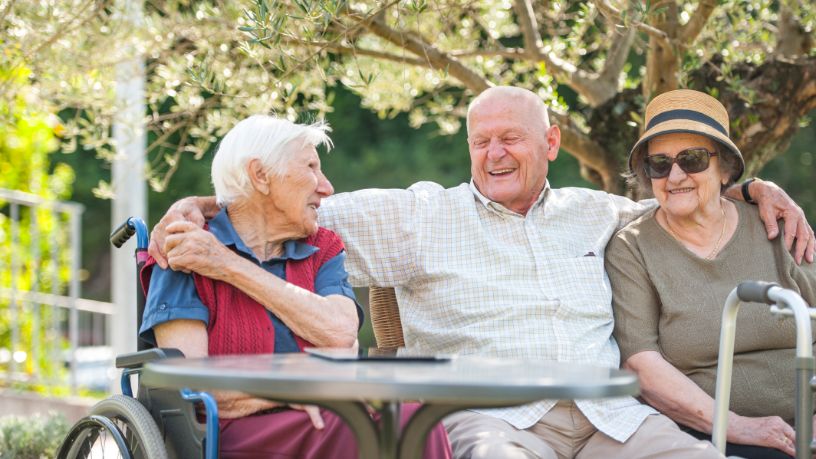Because a stroke can affect your brain, there are physical, mental and emotional impacts.
On this page
Key takeaways
Family members, friends and carers may also need support following the stroke of a loved one.
If you think you or someone else is having a stroke, call triple zero (000) immediately.
When Bill Gasiamis had a stroke at the age of 37, his decision to put off seeking medical help, and the subsequent seizure, left him struggling with devastating physical and emotional symptoms. By the age of 40, he’d suffered 3 brain bleeds.
Surviving a stroke is only part of the battle. What you do after it can determine how well you’re able to recover.
How long does it take to recover from a stroke?
The physical changes experienced after a stroke can depend on which area of the brain is injured and how much of the brain has been permanently damaged.1 Your age, health and medical history can also influence your recovery.
For many stroke victims, recovery and rehabilitation can be slow and difficult. Because of this, stroke survivors may feel frustrated, anxious or depressed following their stroke.
The physical effects of a stroke
Because a stroke affects the brain, it can impact almost every aspect of your life. Some symptoms might be immediately visible, while others can take time to appear, even worsening as time goes by.
Post-stroke physical problems may include:
- weakness and swelling in the arms or legs
- stiff or painful joints
- muscle spasms
- overactive reflexes
- involuntary jerking.2
These physical symptoms may make it difficult for stroke survivors to hold things or coordinate movements.
Life after a stroke may be further complicated by numbness or a tingling sensation in the affected areas. This may make it difficult to sense hot and cold on the affected side.
Fatigue is also a common issue after a stroke. For Bill, this made even the simplest tasks hard. “It was difficult for me to walk for 5 metres without becoming extremely exhausted,” he says.
As actions that were once easy now require more effort, this can be frustrating for a stroke survivor. But recovery takes time. It’s important to remind yourself to continue moving forward regardless of the slow pace of your recovery. Small steps lead to big progress.
The mental effects of a stroke
One of the biggest impacts of a stroke is the effect it has on the brain. Depending on the damaged area, a stroke can impact your:
- memory
- attention
- orientation
- learning and awareness
- written and verbal communication.3
This means that life after a stroke can involve new difficulties with writing, reading, speaking and communicating.
For Bill, these post-stroke symptoms meant that he struggled to form and complete sentences, had difficultly reading and concentrating, and often forgot to feed his cat.
Having a stroke can also affect your sleep. This can compound other post-stroke symptoms, making your recovery more difficult.4
Are you in need of urgent support?
We've put together a list of services for free support that's relevant to where you live, and what you're going through.
Effects on emotions
The above symptoms can knock-on to emotional problems following a stroke, including fear, depression and anxiety. In fact, about one in 2 stroke survivors will experience depression and one in 4 will experience anxiety.5
Bill experienced a lot of anger following his stroke. He also found himself crying "at the drop of a hat" and was highly emotional.
Emotional changes can be the result of frustration over symptoms and loss of independence. It may also link to the physical damage to areas of your brain responsible for emotional regulation. This is why stroke survivors sometimes find that aspects of their personality are impacted by their stroke.6
As your ability to communicate may be affected, it might also become difficult to simply express your feelings and emotions after a stroke.
Adjusting to life after a stroke can also be hard for family, friends and carers. Emotional reactions may improve with time, but you might find you have longer-lasting emotional difficulties.
Whether you’re a stroke survivor or an affected family member, it’s a good idea to reach out for help when symptoms become severe or persist for longer than 2 weeks.
After his stroke, Bill found that speaking with a psychologist was particularly helpful for both him and his family. Many stroke survivors find that being able to talk about their experiences not only validates them, but also helps create ways to deal with the emotional impact.
To help manage your emotional and mental health after a stroke, your doctor may refer you to a psychologist or arrange other support. Depending on your symptoms, you may also be prescribed medication.
Resources
If you think you or someone else is having a stroke, call triple zero (000) immediately.
StrokeLine has resources online plus over-the-phone support on 1800 787 653.
Lifeline Australia is a 24/7 crisis support service available online and over the phone on 13 11 14.
Beyond Blue offers 24/7 mental health information and support online and on the phone at 1300 224 636.

At Bupa, trust is everything
Our health and wellbeing information is regularly reviewed and maintained by a team of healthcare experts, to ensure its relevancy and accuracy. Everyone's health journey is unique and health outcomes vary from person to person.
This content is not a replacement for personalised and specific medical, healthcare, or other professional advice. If you have concerns about your health, see your doctor or other health professional.
1Johns Hopkins Medicine. (2023). Effects of Stroke. Johns Hopkins Medicine.
2Stroke Foundation. (2024). Life after stroke or TIA. Stroke Foundation.
3Better Health Channel. (2015). Effects of stroke. Victoria State Government, Department of Health.
4Stroke Foundation. (2013). Sleeping difficulties. Stroke Foundation.
5Stroke Foundation. (2024). Depression and anxiety after stroke. Stroke Foundation.
6Stroke Foundation. (2024). Emotional and personality changes after stroke. Stroke Foundation.
You might also like...
Coronary heart disease: The basics
As a leading cause of death in Australia, coronary heart disease is important to understand. Find out how this condition might affect you.
Health checks and screening at every stage of life
It’s important to make sure you get the right health checks throughout your life, from your 20s to your 50s and beyond. Check out our guide to learn more.
Smoking: The immediate health benefits of quitting
When you decide to stop smoking, your health and wellbeing begin to improve almost immediately. So, what happens to your body when you quit?
Dialysis for chronic kidney failure
Chronic kidney failure may be caused by an underlying health condition and is often treated with dialysis. Get to know the different treatment options.





